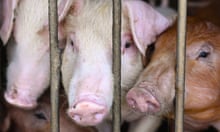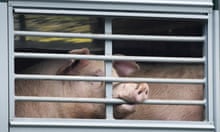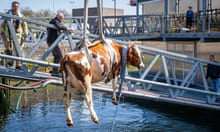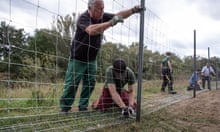An outbreak of African swine fever terrorising pig farmers in Europe has dramatically escalated with the confirmation that the deadly infectious disease has spread to Belgium.
The discovery of the highly contagious disease in two wild boars found dead near the town of Étalle, in Gaume, has sparked calls for a mass cull of that species to protect western Europe’s pork industry.
The Dutch and French authorities have been put on high alert while Belgium’s farming minister, René Collin, has ordered a ban on hunting until mid-October, along with restrictions on the movement of animals across a territory of 63,000 hectares in the south of the country. Walkers have been asked to stay on footpaths and 67 farms are being tested for signs of an outbreak.
African swine fever was last seen in Belgium in 1985, and led to the culling of 30,000 pigs. It causes haemorrhaging and is incurable in pigs, although it is not dangerous for humans.
Discovery of the disease in Europe’s second-largest farm in Romania last month resulted in the culling of 140,000 animals.
The Belgian Syndicat Agricole Général, representing Belgian farmers, has asked for the immediate “coordinated and controlled shooting of wild boars on the entire territory of Belgium”.
A spokesman said: “Only then can the outbreak be isolated and limited to the zone where the virus was diagnosed. Only then can the ticking time bomb be dismantled. No other option is possible.”
The government has urged calm. The European commission said it would deploy experts to coordinate with the Belgian authorities. The health commissioner, Vytenis Andriukaitis, is to meet regional ministers on Monday.
A commission spokesman said: “The Belgian authorities announced yesterday that two isolated cases of African swine fever in two wild boars found dead in the forest in the region of Étalle. A team of experts was requested by them and will be deployed this weekend”.
Kris Peeters, the Belgian minister of economy and consumers, said the government needed to assure markets for Belgian meat that the problem was under control. “We have to make clear to those countries that we will follow up the case thoroughly and take measures so that our exports are not endangered,” he said.
African swine fever was wiped out in Europe in the 1990s through concerted surveillance and culling, along with a major modernisation of farming methods.
It reemerged in 2014 in central and eastern Europe, with cases reported in Lithuania, Poland, Latvia and Estonia. Outbreaks were also confirmed in the east of the Czech Republic in June 2017, and in Romania and Hungary earlier this year.
There have been strenuous efforts made to keep the disease away from the most intensively farmed areas of Europe in the north-west of the continent.
Germany has offered eastern European authorities assistance on disease control. Denmark has announced plans to build a fence along its border with Germany to keep the fever out should it expand that far.
There are fears that exports to non-EU countries from Europe, the world’s biggest exporter of pork, could be shut down if the disease was to get into the animal population in western Europe.
The Dutch farmers organisation, LTO Netherlands, said it was the first time that African swine fever had been found so close to the Netherlands.
The Dutch department for agriculture said officials were keeping a close eye on developments “because Belgium is a lot closer than Romania”, according to a spokesman.
In recent weeks, the Chinese authorities have ordered culls across the country and a ban on the movement of live pigs in reaction to outbreaks of African swine fever in 10 of its provinces.









